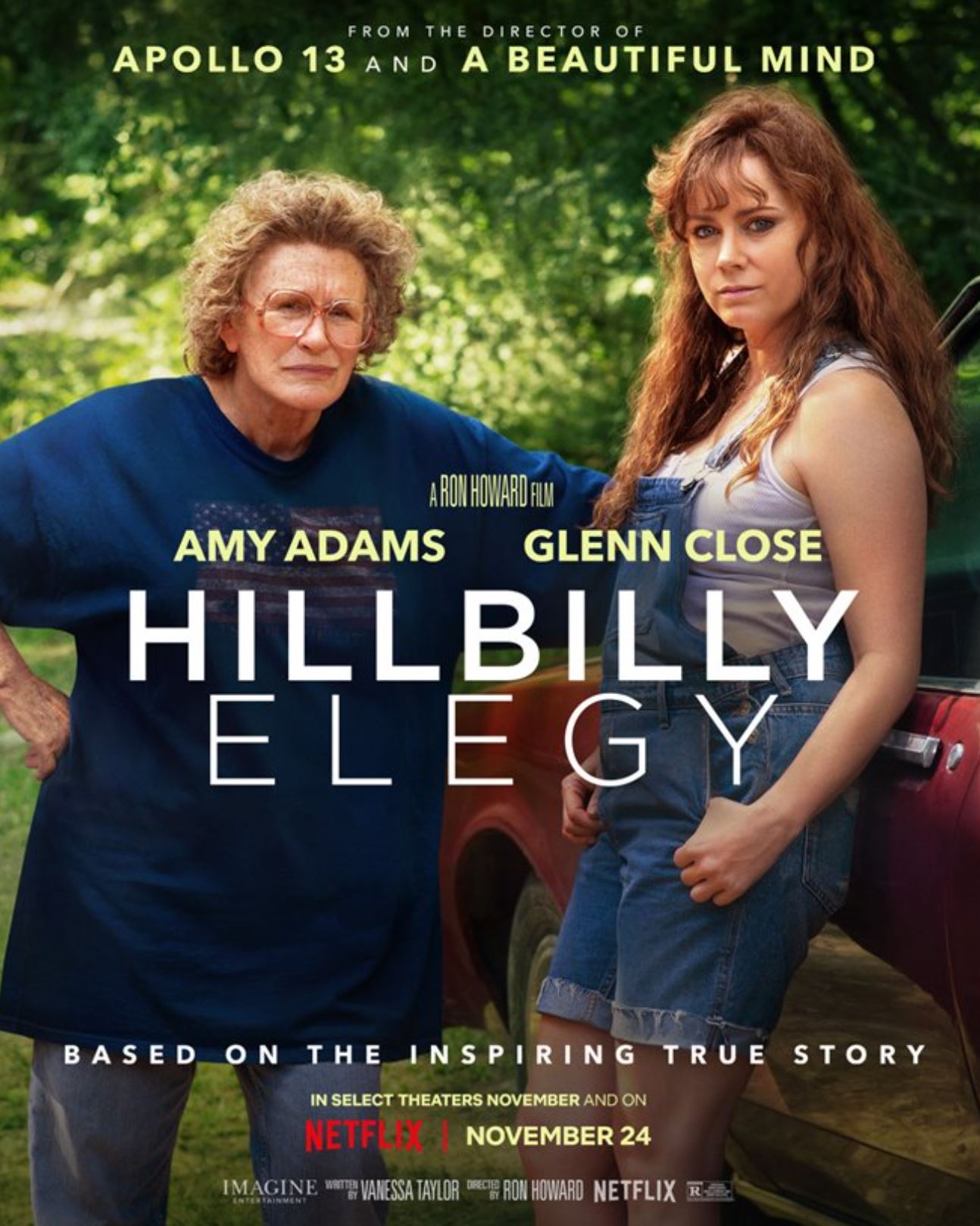Glenn Close and Amy Adams in Hillbilly Elegy



J.D. Vance’s memoir, Hillbilly Elegy, was a 2016 bestseller and was held up as an explainer for the newly minted Trump’s America and the “economic anxiety” that precipitated it, downplaying white resentment of a Black president and instead emphasizing the blue-red swing of rural central America as the result of social rot. Equal parts personal memoir and screed about bootstrapping your way out of poverty (when you’re an able-bodied, straight, white man embraced first by the military and then corporate America after that), Hillbilly Elegy is about one mid-American family’s struggle with the failing American dream that is totally blind to all the ways the American dream DID work for Vance, with bonus complaints about poor people having cell phones. Given that the book’s faux-political stylings did not age well even in four (interminable) years, it is no surprise that Ron Howard’s film adaptation, scripted by Vanessa Taylor (The Shape of Water), opts to jettison almost all of Vance’s musings on small-town America, in favor of focusing on his family drama.
Hillbilly Elegy is a classic dysfunctional family drama that flips between J.D.’s impoverished past and his Ivy League present. The political stuff is almost entirely relegated to a transition shot showing the deterioration of Middletown, Ohio from post-war industrial center to post-industrial wasteland. It’s a pretty good shot, and the kind of filmmaking Howard excels at—competent, unshowy, but emotionally effective. The best point Vance ever made is that when industrialization left middle America, no new industry came in to replace it, so places like Middletown were left to flounder, and then the opioid crisis arrived, and it’s been a nightmare ever since. This is the cycle J.D.’s family is stuck in. Played as a child by Owen Asztalos (Diary of a Wimpy Kid: The Long Haul), and as an adult by Gabriel Basso (The Kings of Summer), J.D. watches his mother, Bev (Amy Adams), get caught in the cycle of poverty his “Mamaw” (Glenn Close) was unable to break.
On the eve of a big interview that will make or break his budding law career, Yale student J.D. has to go back to Ohio to deal with his mother’s latest breakdown—just as he is about to clear the dark waters of Middletown, his mother is sucking him back in. Bev has overdosed on heroin, and J.D. goes to help his sister (Hayley Bennett) attempt to settle Bev in a rehab facility. Middletown has become the kind of place where its citizens have opinions on every local rehab facility, the way most people have opinions on local restaurants. Intermixed with J.D.’s present are his memories of his mother and family from his childhood, with halcyon summers spent in Appalachia, where a child’s forgiving eyes see past the poverty to the natural beauty of the place and a turbulent upbringing in Middletown with his volatile mother and harsh grandmother.
There is a juicy family drama somewhere in here, but Hillbilly Elegy is not it. I cannot believe Vanessa Taylor went from the nuanced beauty of The Shape of Water to the blunt-instrument obviousness of Hillbilly Elegy—I would like a list of all the writers whose names are NOT attached to this script. Who left Vanessa Taylor holding the bag? Of course, the book isn’t very good and obviously Ron Howard had no interest in engaging with the politics of it, which doesn’t leave much left to mine. Most of Hillbilly Elegy is J.D. looking confused or annoyed while Adams emotes at eleven and Close makes her best tight-lipped faces—nothing in Hillbilly Elegy is worth their time. Their dialogue is often corny, and Bev has no arc, so Adams is just doing variations on “Oh great, now THIS” the whole time. Both of these women deserve awards and accolades, but not for this, not for something so grossly beneath them.
Hillbilly Elegy is exactly the kind of movie that makes “Oscar bait” the target of ridicule. It’s a Serious Drama starring A-list talent doing poverty porn for trophies, with a credible, if unflashy, director at the helm. It looks nice enough (it’s lensed by Maryse Alberti, who shot Velvet Goldmine) and Hans Zimmer has a hand in the score, so it sounds important, but there is nothing under the hood. You won’t remember anything about Hillbilly Elegy ten minutes after seeing it. Its observations about middle America have been made better elsewhere, and every single actor involved has given better performances in other movies—Basso is terrific in The Kings of Summer. I would almost recommend the book over the movie, because at least the book is memorable, but instead you should just read Jonathan Metzl’s Dying of Whiteness and Carol Anderson’s White Rage. And if you just have to watch a dramatization of post-industrial America eating itself, watch Justified. At least it’s entertaining.
Hillbilly Elegy will stream on Netflix from November 24.
https://www.youtube.com/watch?v=wZgPoRuII3E
